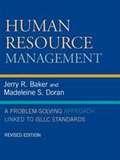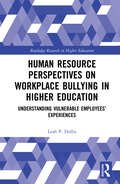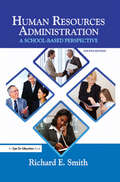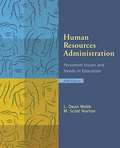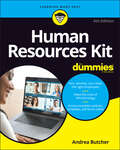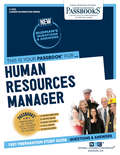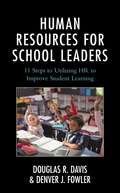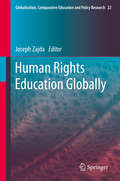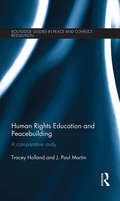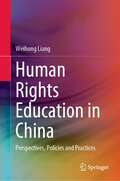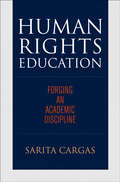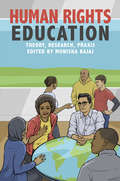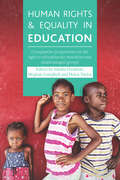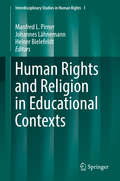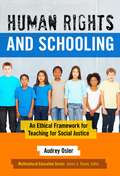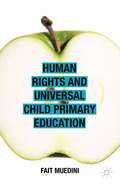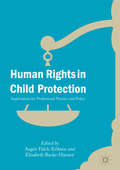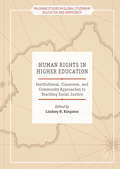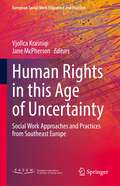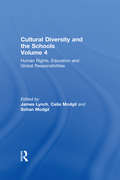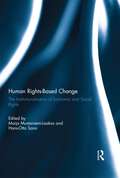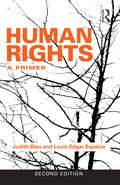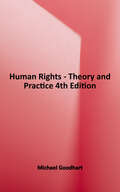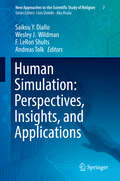- Table View
- List View
Human Resource Management: A Problem-Solving Approach Linked to ISLLC Standards
by Jerry R. Baker Madeleine S. DoranThis publication is not a traditional textbook dealing with human resource management. Rather, it is a tool for training and assessing school administrators using in-basket exercises based on issues and situations encountered in today's workplace. Working through the in-basket exercises included in this publication will give students an opportunity to apply their knowledge and skills to situations they are very likely to face on the job.
Human Resource Perspectives on Workplace Bullying in Higher Education: Understanding Vulnerable Employees' Experiences (Routledge Research in Higher Education)
by Leah P. HollisThis analytical volume uses qualitative data, quantitative data, and direct employee experiences to aid understanding of why workplace bullying occurs in universities throughout the US. To address higher education workplace bullying, this text offers data-driven interventions for human resource staff and departments to effectively tackle this destructive phenomenon. Drawing on Hollis’ first-hand research which is supported by findings from a 2019 Human Resources data collection, this text identifies populations which are most vulnerable to discrimination within academia. The data shows how human resource departments, executive leadership, and faculty might proactively intervene to prevent workplace bullying. Divided into two parts, the book offers empirical analysis of structural interventions for human resource efforts to combat workplace bullying in higher education. Second, the book puts forth solutions based on empirical findings for organizations and human resources to combat workplace aggression and civility which hurts higher education. Further, the author examines the specific effect of workplace harassment and cyberbullying on women of color, junior faculty, women, and the LGBTQ community. This text will benefit researchers, doctoral students, and conducting higher education research. Additionally, the book focusses on structural issues which interfere with multicultural education more broadly. Those interested in Human Resource Management, the sociology of education, and gender and sexuality studies and will also enjoy this volume.
Human Resource Training and Development
by University of MadrasThe complete set of learning materials for Paper - XIX (Elective - Human Resource) Training and Development has been prepared in the self - learning format. This is a significant step taken by the This towards realizing the mission to “develop citizens with knowledge, skill and character leading to societal transformation and national development”.
Human Resources Administration: A School Based Perspective
by Richard SmithEnhanced and updated, this Fourth Edition of Richard E. Smith’s highly successful text examines the growing role of the principal in planning, hiring, staff development, supervision, and other human resource functions. The Fourth Edition includes new sections on ethics, induction, and the role of the mentor teacher. This edition also introduces "From the Desk of a Principal," a feature which connects the book’s content and applications to the experiences of real school principals.
Human Resources Administration: Personnel Issues and Needs in Education (5th edition)
by L. Dean Webb M. Scott NortonPersonnel costs make up 75 to 85 percent of the typical school district budget. Because personnel are so important to the achievement of the goals and objectives of an educational system, human resources administration is of central importance. The new fifth edition ofHuman Resources Administrationallows those studying the field to learn relevant laws and policies, explore the application of computer technology, and discover successful collective negotiation strategies. For further success, this text helps readers develop integrated planning processes and communication systems while fostering a relationship of mutual respect and cooperation among the staff, the administration, and the school board. The revised fifth edition includes increased coverage of various topics as well as a number of new features. A new chapter on staff development discusses effective staff development programs as well as five key steps in the staff development process while added coverage on the applications technology to the human resources field brings the text up to date. Case studies in each chapter help readers apply what they have just read to realistic situations in the workplace while visual organizers such as charts and tables add easy-to-understand illustrations of chapter concepts and lessons.
Human Resources Kit For Dummies
by Andrea ButcherThe talent professional’s one-stop reference for best practices and tips Human Resources Kit For Dummies is the guide talent pros turn to for improving their leadership across the businesses they serve. The world of HR is full of unforeseen challenges, and this For Dummies reference will help you to handle them with grace and professionalism. This book provides tips and tricks for creating an engaging employee experience from the get-go, prioritizing employee well-being and health, navigating the recent wave of resignations, and implementing better hiring practices. In this new era of virtual offices, you’ll also learn to implement remote and hybrid onboarding and work models. Plus, you’ll explore HR technologies, learning and development strategies that get results, hiring ethics, diversity and inclusion best practices, social media uses and policies, and beyond. Learn all the functions of the human resources role Discover new software, HR best practices, and employment trends Make your organization more ethical with diversity, equity, and inclusion initiatives Get insights on how to navigate remote workers and other common HR challenges New and working HR professionals will love this friendly, easy-to-read resource for developing HR skills. If you’re a business owner, this book can also help you recruit, hire, and retain the right people, or build an HR function that gets results!
Human Resources Manager: Passbooks Study Guide (Career Examination Series)
by National Learning CorporationThe Human Resources Manager Passbook® prepares you for your test by allowing you to take practice exams in the subjects you need to study. It provides hundreds of questions and answers in the areas that will likely be covered on your upcoming exam.
Human Resources for School Leaders: Eleven Steps to Utilizing HR to Improve Student Learning
by Douglas R. Davis Denver J. FowlerHuman Resources for School Leaders contains comprehensive and systematic coverage of all aspects of public school human resource management. Unlike other books focused on this topic, the authors ground their text on "student learning" and outline strategies designed to enhance school climate and culture. The early chapters focus on relevant theories and research supporting current human resource methods- required learning in any educational leadership preparation program. The following chapters take a more practitioner approach as main topics include recruiting, hiring, orientation, mentoring, leading, and professional growth of teachers. The differentiating factors between this text by Davis &Fowler and other texts on the market is (1) the forward looking approach taken by the authors in that they not only exam current 21st century HRD practices but also give the reader insight into future HRD methods in a century dominated by K-12 marketization; (2) the focus on building level HRD systems; and (3) the thorough descriptions of available technology tools that can be utilized to improve HRD systems and heighten quality control through efficient data-based decisions thereby impacting instructional capacity and student learning. The case studies are relevant and relatable, and offer practical strategies and techniques that can be easily implemented at the building or district level.
Human Rights Education Globally (Globalisation, Comparative Education and Policy Research #22)
by Joseph ZajdaThis book presents a comprehensive overview of selected research concerning global and comparative trends in dominant discourses on human rights education. Using diverse paradigms, ranging from critical theory to historical-comparative research, the book examines major human rights education reforms and policy issues in a global culture with a focus on the ambivalent and problematic relationship between human rights education discourses, ideology and the state. Further, it discusses democracy, national identity, and social justice, which are among the most critical and significant factors defining and contextualising the processes surrounding nation-building, identity politics and human rights education globally, and also critiques current human rights education practices and policy reforms, illustrating the shifts in the relationship between the state and human rights education policy.Written by authors from diverse backgrounds and regions, the book examines current developments in research concerning human rights education, and citizenship education globally. As such it enables readers to gain a more holistic understanding of the nexus between nation-state, national identity and human rights education both locally and globally. It also provides an easily accessible, practical yet scholarly insights into international concerns in the field of human rights education in the context of global culture.
Human Rights Education and Peacebuilding: A comparative study (Routledge Studies in Peace and Conflict Resolution)
by Tracey Holland J. Paul MartinThis book assesses the role of human rights education (HRE) in the peacebuilding field. Today, most governments, international organisations and non-governmental organisations recognise the importance of human rights in peace- and democracy-building activities in post-conflict regions. However, compared with other components of peacebuilding, little attention and funding have been given to the cultivation of human rights knowledge and skills within these populations. Almost nothing has been committed to understanding how HRE is best accomplished in such difficult circumstances. Human Rights Education and Peacebuilding demonstrates the promise of HRE programs to help bring about peace within challenging post-conflict contexts. Each chapter of this book (a) identifies the short and medium term impacts of seven different HRE programs on their respective target groups, and (b) provides an analysis of the peculiar local contextual factors that influenced each program’s rationale for human rights education. More specifically, each chapter addresses these critical questions: - How are communities around the world using HRE to help rebuild their lives in the aftermath of an armed conflict? - How does HRE respond local problems and needs? How similar are the human rights impacts in the different projects? - How can we understand the promise and challenges associated with HRE as a component of community peace-building? This book will be of much interest to students of peacebuilding, conflict resolution, human rights, education studies and IR in general.
Human Rights Education in China: Perspectives, Policies and Practices
by Weihong LiangThe book provides new research highlighting perspectives, perceptions, and practices regarding human rights and human rights education in China. It traces the emergence and evolution of the human rights conception and human rights education from comparative perspectives. China’s deeply embedded philosophical and cultural traditions shed light on its ideas of human rights and human rights education. The efforts to construct an independent and strong nation-state since the mid-to-late nineteenth century fashioned the Chinese thinking of rights and citizenship, and the reciprocal relation between the individual and community/state.With the help of collected data, the book unpacks that the goal-making and content-selection of human rights education in China rely heavily on the provisions given by central authorities; however, the practices have different facets depends on how the people perceive and respond those requirements in the school and classroom contexts. The book concludes by explaining the human rights education in China as a socialization project for citizenship-making, and suggests that China’s doctrine on human rights and human rights education is closely associated with cultural relativization and social construction.Though China is just beginning to develop human rights education in its education systems, this study suggests possible direction for future research. How to live with human rights should be included further in schooling, especially how to infuse human rights education into all aspects of school day-to-day life.
Human Rights Education: Forging an Academic Discipline (Pennsylvania Studies in Human Rights)
by Sarita CargasIn tracing the origins of the modern human-rights movement, historians typically point to two periods: the 1940s, in which decade the Universal Declaration of Human Rights (UDHR) was ratified by the United Nations General Assembly; and the 1970s, during which numerous human rights nongovernmental organizations (NGOs), most notably Amnesty International and Médecins Sans Frontières, came into existence. It was also in the 1970s, Sarita Cargas observes, when the first classes in international human rights began to be taught in law schools and university political science departments in the United States.Cargas argues that the time has come for human rights to be acknowledged as an academic discipline. She notes that human rights has proven to be a relevant field to scholars and students in political science and international relations and law for over half a century. It has become of interest to anthropology, history, sociology, and religious studies, as well as a requirement even in social work and education programs. However, despite its interdisciplinary nature, Cargas demonstrates that human rights meets the criteria that define an academic discipline in that it possesses a canon of literature, a shared set of concerns, a community of scholars, and a methodology.In an analysis of human rights curricula in Australia, Canada, the United Kingdom, and the United States, Cargas identifies an informal consensus on the epistemological foundations of human rights, including familiarity with human rights law; knowledge of major actors including the United Nations, governments, NGOS, and multinational corporations; and, most crucially, awareness and advocacy of the rights and freedoms detailed in the articles of the UDHR. The second half of the book offers practical recommendations for creating a human rights major or designing courses at the university level in the United States.
Human Rights Education: Theory, Research, Praxis
by Nancy Flowers Monisha BajajOver the past seven decades, human rights education has blossomed into a global movement. A field of scholarship that utilizes teaching and learning processes, human rights education addresses basic rights and broadens the respect for the dignity and freedom of all peoples. Since the founding of the United Nations and the adoption of the Universal Declaration of Human Rights in 1948, human rights education has worked toward ensuring that schools and non-formal educational spaces become sites of promise and equity.Bringing together the voices of leaders and researchers deeply engaged in understanding the politics and possibilities of human rights education as a field of inquiry, Monisha Bajaj's Human Rights Education shapes our understanding of the practices and processes of the discipline and demonstrates the ways in which it has evolved into a meaningful constellation of scholarship, policy, curricular reform, and pedagogy. Contributions by pioneers in the field, as well as emerging scholars, constitute this foundational textbook, which charts the field's rise, outlines its conceptual frameworks and models, and offers case studies from Africa, Asia, Latin America, Europe, the Middle East, and the United States. The volume analyzes how human rights education has been locally tailored to diverse contexts and looks at the tensions and triumphs of such efforts.Historicizing human rights education while offering concrete grounding for those who seek entry into this dynamic field of scholarship and practice, Human Rights Education is essential reading for students, educators, researchers, advocates, activists, practitioners, and policy makers.Contributors: Monisha Bajaj, Ben Cislaghi, Nancy Flowers, Melissa Leigh Gibson, Diane Gillespie, Carl A. Grant, Tracey Holland, Megan Jensen, Peter G. Kirchschlaeger, Gerald Mackie, J. Paul Martin, Sam Mejias, Chrissie Monaghan, Audrey Osler, Oren Pizmony-Levy, Susan Garnett Russell, Carol Anne Spreen, David Suárez, Felisa Tibbitts, Rachel Wahl, Chalank Yahya, Michalinos Zembylas.
Human Rights and Equality in Education: Comparative Perspectives on the Right to Education for Minorities and Disadvantaged Groups
by Sandra FredmanThousands of children from minority and disadvantaged groups will never cross the threshold of a classroom. What can human rights contribute to the struggle to ensure that every learner is able to access high quality education? This brilliant interdisciplinary collection explores how a human rights perspective offers new insights and tools into the current obstacles to education. It examines the role of private actors, the need to hold states to account for the quality of education, how to strike a balance between religion, culture and education, the innovative responses needed to guarantee girls’ right to education and the role of courts. This unique book draws together contributors who have been deeply involved in this field from both developing and developed countries which enriches the understanding and remedial approaches to tackle current obstacles to universal education.
Human Rights and Religion in Educational Contexts
by Manfred L. Pirner Johannes Lähnemann Heiner BielefeldtWhat is the role of religion(s) in a human rights culture and in human rights education? How do human rights and religion relate in the context of public education? And what can religious education at public schools contribute to human rights education? These are the core questions addressed by this book. Stimulating deliberations, illuminating analyses and promising conceptual perspectives are offered by renowned experts from ten countries and diverse academic disciplines.
Human Rights and Schooling: An Ethical Framework for Teaching for Social Justice (Muliticultural Education)
by Audrey OslerMost of the struggles for equitable schooling, including multicultural curricula and culturally responsive teaching, have largely taken place on a local or national stage, with little awareness of how international human rights standards might support these struggles. <p><p>Human Rights and Schooling explores the potential of human rights frameworks to support grassroots struggles for justice and examines the impact that human rights and child rights education can make in the lives of students, including the most marginalized. The author, Audrey Osler, examines the theory, research, and practice linking human rights to education in order to broaden the concept of citizenship and social studies education. <p><p>Bringing scholarship and practice together, the text uses concrete examples to illustrate the links between principles and ideals and actual efforts to realize social justice in and through education. Osler anchors her examination of human rights in the U.N Convention on the Rights of the Child, as well as the U.N. Declaration on Human Rights Education and Training.
Human Rights and Universal Child Primary Education
by Fait MuediniThis book examines the progress toward universal child primary education, and the obstacles that remain. Fait Muedini describes the current state of child primary education, the international laws that support the right to free childhood education, and the positive gains that are paving the way to universal free schooling. He also discusses remaining legal and logistical roadblocks still to be overcome by the NGOs and international organizations that strive to deliver free education to allchildren. The benefits to free primary education ripple throughout the world system, and this discussion illuminates the current state of universal education delivery and points the way to next steps.
Human Rights in Child Protection: Implications For Professional Practice And Policy
by Asgeir Falch-Eriksen Elisabeth Backe-HansenThis open access book critically explores what child protection policy and professional practice would mean if practice was grounded in human rights standards. This book inspires a new direction in child protection research – one that critically assesses child protection policy and professional practice with regard to human rights in general, and the rights of the child in particular. Each chapter author seeks to approach the rights of the child from their own academic field of interest and through a comparative lens, making the research relevant across nation-state practices. The book is split into five parts to focus on the most important aspects of child protection. The first part explains the origins, aim, and scope of the book; the second part explores aspects of professionalism and organization through law and policy; and the third part discusses several key issues in child protection and professional practice in depth. The fourth part discusses selected areas of importance to child protection practices (low-impact in-house measures, public care in residential care and foster care respectively) and the fifth part provides an analytical summary of the book. Overall, it contributes to the present need for a more comprehensive academic debate regarding the rights of the child, and the supranational perspective this brings to child protection policy and practice across and within nation-states.
Human Rights in Higher Education: Institutional, Classroom, And Community Approaches To Teaching Social Justice (Palgrave Studies In Global Citizenship Education And Democracy Ser.)
by Lindsey N. KingstonThis book focuses on human rights education (HRE) in higher education, with an emphasis on supporting undergraduate education for social justice and global citizenship at the institutional, classroom, and community levels. Drawing from the work of human rights scholars and advocates at Webster University, Kingston begins a critical discussion about the potential of HRE on college campuses and beyond. Chapter contributors address the institutional issues inherent to building a “human rights campus,” promoting just governance models, facilitating student research, and fostering inclusive campus communities. They further explore opportunities within the classroom by highlighting dynamic courses on global sustainable development and post-genocide reconciliation, as well as considering how to create trauma sensitive learning spaces and utilize photography as a human rights teaching tool. Finally, scholar-advocates detail how HRE can be expanded to include the broader community—including teaching critical criminology to aspiring police officers, facilitating community dialogue through academic conferences, and engaging in social justice work related to access to justice, domestic violence, and human trafficking.
Human Rights in this Age of Uncertainty: Social Work Approaches and Practices from Southeast Europe (European Social Work Education and Practice)
by Vjollca Krasniqi Jane McPhersonThis book, grounded in a human rights framework, takes a close look at social work approaches and practices in Southeast Europe. Human rights are central in today's understanding of social work as an academic discipline and as a professional practice. Looking at social work through a human rights lens unmasks inequality and discrimination, promotes ethical engagements, and contributes to the social, political, and economic betterment of society. Moreover, human rights and social work are interdependent and have far-reaching implications at macro, mezzo, and micro levels both in the realm of social policy and in professional practice.This collection of eight chapters provides an overview of human rights practices in social work in Albania, Bosnia and Herzegovina, Bulgaria, Croatia, Kosovo, Romania, and Slovenia. It presents state-of-the-art research on human rights and social work through individual country-focused chapters. In addition, it includes an integrative introductory chapter that identifies and discusses the commonalities and differences across the region as well as future directions.The book takes an integrated approach with conversations among the contributors on three main questions:What is the state of human rights in social work?How are human rights practiced in social work? What are the prospects for an integrated approach to human rights in social work in contemporary Southeast Europe?Human Rights in this Age of Uncertainty is essential reading for social work academics and practitioners in Southeast Europe due to its geographic focus and standpoints from the specific countries of the region. The book also should appeal to a wider European audience (especially as the book features chapters from both inside and outside of the European Union), as well as to an international audience of social work scholars. In addition, policy-makers may find the book a useful resource because human rights discourse features prominently in the international approaches to welfare systems across Southeast Europe as part of the Europeanisation processes currently at play.
Human Rights, Education & Global Responsibilities
by James Lynch Sohan Modgil Celia ModgilFirst published in 1992. This is Volume 4 of a series of four on Cultural Diversity and the Schools and focusses on Human Rights, Education and Global Responsibilities. One of the major problems facing societies in almost all parts of the world is the inadequate accommodation of social equity with cultural diversity. The crisis emanating from neglect of this issue can be seen in societies as different and wide apart as the Soviet Union, India, Pakistan, the United States and the United Kingdom. This series seeks to contribute, through joint publication and the stimulation of greater discourse, to identify the pathways to a less selfish and parochial response to the continuing dilemma of equity and diversity, not solely within the nation state, but also internationally.
Human Rights-Based Change: The Institutionalisation of Economic and Social Rights
by Maija Mustaniemi-Laakso and Hans-Otto SanoThis book provides different analytical perspectives into how human rights-based approaches to development (HRBADs) contribute to change. Based on the understanding that HRBADs are increasingly integrated into development and governance discourse and processes in many societies and organisations, it explores how the reinforcement of human rights principles and norms has impacted the practices and processes of development policy implementation. To reflect on the nature of the change that such efforts may imply, the chapters examine critically traditional and innovative ways of mainstreaming and institutionalising human right in judicial, bureaucratic and organisational processes in development work. Attention is also paid to the results assessment and causal debates in the human rights field. The articles discuss important questions concerning the legitimacy of and preconditions for change. What is the change that development efforts should seek to contribute to and who should have the power to define such change? What is required of institutional structures and processes within development organisations and agencies in order for human rights integration and institutionalisation to have transformative potential? This book was previously published as a special issue of the Nordic Journal of Human Rights.
Human Rights: A Primer
by Judith Blau Louis Edgar EsparzaHuman Rights: A Primer breaks new ground in clarifying for undergraduates the international significance of human rights. This new edition highlights current and recent developments, using themes familiar to undergraduates. For example, Americans are increasingly aware of the growing disparities in economic well-being. It is indeed a crisis that is global and national. Because this book focuses on globalization and human rights as intertwined, readers will gain a comprehensive understanding of the role of neoliberal capitalism in undermining human rights (dignity, security, and well-being). Major works by Thomas Piketty and Joseph Stiglitz are discussed, along with recent upheavals in Greece, and the rising tide of refugees in Europe and North America. Furthermore, powerful forces that will increasingly test global solidarity and the future of the planet relate to the extent that countries and peoples cooperate in combating global warming and promoting sustainable development goals (SDGs). Key dates for both these issues occurred in the second half of 2015 – the UN Sustainable Development Summit in September and the Paris Climate Conference (COP21) in December. The significance of both conferences for human rights is discussed in this new edition.
Human Rights: Theory and Practice, 4th Edition
by Michael GoodhartHuman Rights: Theory and Practice is a comprehensive, interdisciplinary text written by a global team of experts with coverage and content unrivaled by any other text on the market. With contributions from an international panel of experts--including political scientists, lawyers, philosophers, and policy-makers--this text is unmatched in its ability to provide students with a practical, comprehensive, and twenty-first-century perspective on the theory, study, and practice of human rights. In addition to in-depth theoretical content, the book features unrivaled coverage of human rights issues in practice, with a wide range of case studies allowing students to explore true-to-life examples from around the world. There are also dynamic pedagogical features that encourage critical analysis, challenge students to question their assumptions, and facilitate class dialogue on key issues. The fourth edition is fully up-to-date, with new readings centered on recent and relevant issues.
Human Simulation: Perspectives, Insights, and Applications (New Approaches to the Scientific Study of Religion #7)
by Wesley J. Wildman Andreas Tolk F. LeRon Shults Saikou Y. DialloThis uniquely inspirational and practical book explores human simulation, which is the application of computational modeling and simulation to research subjects in the humanities disciplines. It delves into the fascinating process of collaboration among experts who usually don’t have much to do with one another – computer engineers and humanities scholars – from the perspective of the humanities scholars. It also explains the process of developing models and simulations in these interdisciplinary teams. Each chapter takes the reader on a journey, presenting a specific theory about the human condition, a model of that theory, discussion of its implementation, analysis of its results, and an account of the collaborative experience. Contributing authors with different fields of expertise share how each model was validated, discuss relevant datasets, explain development strategies, and frankly discuss the ups and downs of the process of collaborative development. Readers are given access to the models and will also gain new perspectives from the authors’ findings, experiences, and recommendations. Today we are in the early phases of an information revolution, combining access to vast computing resources, large amounts of human data through social media, and an unprecedented richness of methods and tools to capture, analyze, explore, and test hypotheses and theories of all kinds. Thus, this book’s insights will be valuable not only to students and scholars of humanities subjects, but also to the general reader and researchers from other disciplines who are intrigued by the expansion of the information revolution all the way into the humanities departments of modern universities.
